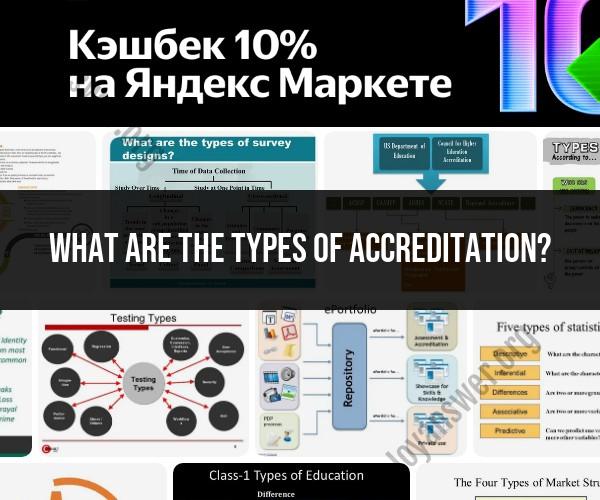What are the types of accreditation?
Accreditation plays a crucial role in ensuring the quality, credibility, and standards of educational institutions, programs, and various organizations. It involves a comprehensive evaluation process to assess whether an entity meets established criteria and standards. Here's an overview of the landscape of accreditation:
1. Types of Accreditation:There are different types of accreditation based on the nature of the entity being accredited:
- Institutional Accreditation: Evaluates entire educational institutions, such as universities and colleges.
- Programmatic Accreditation: Focuses on specific programs or departments within an institution, such as medical schools or engineering programs.
- Specialized or Professional Accreditation: Applies to specialized fields like law, medicine, engineering, nursing, etc.
- Regional Accreditation: Accreditation bodies operate within specific geographic regions and evaluate institutions in those areas.
2. Purpose of Accreditation:Accreditation serves several purposes:
- Quality Assurance: Ensures that educational institutions and programs meet established standards of quality and effectiveness.
- Consumer Protection: Provides students and parents with assurance that the education they receive is of a certain standard.
- Transferability: Credits earned from accredited institutions are often more easily transferable to other institutions.
- Employer Recognition: Accredited degrees are often preferred by employers as they indicate a certain level of quality and rigor.
3. Accreditation Process:The accreditation process typically involves:
- Self-Assessment: The institution or program conducts a self-evaluation based on established standards.
- External Evaluation: Accrediting bodies review the self-assessment, visit the institution, and assess its compliance with standards.
- Decision and Reporting: The accrediting body makes a decision regarding accreditation status and provides a report with recommendations.
4. Accrediting Bodies:Accrediting bodies are organizations responsible for evaluating and accrediting institutions or programs. Examples include:
- Higher Learning Commission (HLC)
- Middle States Commission on Higher Education (MSCHE)
- Accreditation Board for Engineering and Technology (ABET)
- Council on Accreditation of Nurse Anesthesia Educational Programs (COA)
5. International Accreditation:Accreditation is not limited to a single country. There are international accrediting bodies and agreements that assess institutions globally, aiming to ensure consistent quality standards.
6. Continuous Improvement:Accreditation is not a one-time event. Accredited institutions must demonstrate ongoing improvement and compliance with standards to maintain their accreditation status.
7. Accreditation Challenges:
- Standardization: Balancing the need for standardized criteria with the unique missions and characteristics of institutions.
- Evolving Fields: Keeping up with the changing nature of education and emerging fields.
- Consistency: Ensuring consistent evaluation across various institutions and programs.
Accreditation provides a framework for maintaining educational quality and accountability. Prospective students, employers, and other stakeholders often rely on accreditation as a measure of an institution's credibility and the value of its programs.












